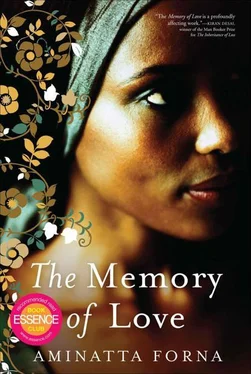A group of men entered the square; one was talking into a megaphone, calling people to gather in the marketplace. This man was wearing fatigues and looked like a soldier. But the men with him were not like soldiers. Soldiers were given more rice than anybody else in the country and they carried the weight of it upon their bodies. These men were narrow and angular, curiously dressed. Jewellery and amulets around their necks, rows of bullets like necklaces, dark sunglasses. Others went barefoot and dressed in rags. Strange, thin men. They reminded Binta of the puppets from the shows she was taken to as a child. They had frightened her even then. The thin men ran around the houses, beating upon the doors and ordering the people outside. There were more sounds of gunfire, of splintering wood, the smell of smoke.
The man with the megaphone ordered everybody to sit down. As new people arrived in the square they were pushed down to the ground. By the end only the man with the megaphone and his men remained standing. He announced his name: Colonel JaJa, and began to speak. Binta listened. At first the talk sounded to her like a political speech, with words like ‘government’ and ‘elections’. He told them the government had betrayed the people, and he spoke a name that before she had only read in the newspapers.
And she realised who these people were and guessed everybody else did too.
Binta’s mouth went dry.
Colonel JaJa shouted an instruction and four of his men came forward bearing a pair of bamboo cages strung between poles. In these boxes were men, tightly huddled into the small space. One of the boxes was opened and the man brought out, an army soldier, Binta guessed, by what remained of his uniform. He struggled to stand and held his side where his uniform was darkly stained. A rope around his waist led to one of JaJa’s men, who pulled at it. The man on the end of the rope offered no resistance and only stumbled after him, his head lowered like a child playing bull. The commander lowered the megaphone from his lips and his words were lost to Binta. She couldn’t take her eyes off the soldier. She missed the motion of the hand to the belt, the drawing of the weapon, the way JaJa took lazy aim before he shot the army soldier in the head. She heard the sound of cheers and claps from JaJa’s men. Somebody near by said, ‘ O Kuru .’ My God. The body lay in the dust; the legs thrashed and were still.
A second cage was opened, another man brought forward. He held his bound hands up and Binta could tell he was begging for his life. Seconds later he too crumpled to the ground. Fear surged through the crowd, people began to panic. The commander spoke into the megaphone and warned them to remain still. Men were brought forward and ordered to move the bodies. Binta recognised them as the workers from the nursery, Agnes’s husband among them. She heard Agnes’s gasp.
The report of the gun. JaJa’s voice. Agnes’s gasp. Other than these sounds it seemed to Binta everything she was watching happened in silence. Dark smoke drifted beyond the roofs of the houses and the dusty smell of burning brick reached the square, carrying with it the magnitude of what was happening that day.
In the middle of the square Agnes’s husband, the eldest of the men, was struggling under the weight of one of the corpses. He was recently out of hospital, where he’d had a hernia operation. Agnes had talked to Binta about it. He stumbled, was hit by one of the thin men, and fell to the ground. The other nursery workers stood still. Binta saw them turn open-handed to JaJa, remonstrating, the way people do when they are afraid. From where she stood she could sense the anger in JaJa, for Binta had known men like him in her life. Men who yearned to inspire fear in others, and yet were angered when they saw it for it reminded them of themselves. The nursery men, though, seemed not to understand and kept coming, their palms turned upwards. Agnes’s husband clambered to his knees, holding his stomach, and reached out his free hand to touch JaJa. No, thought Binta. Don’t touch him. The old man’s fingers grasped at the Colonel’s clothing. The young commander stepped out of reach, then turned and walked away. For several seconds he stood motionless with his back to them all. Binta stopped breathing. Suddenly JaJa swung around and returned to the old man with a swift, unbroken stride, raised his weapon and shot him in the chest. There were screams. The sound of more shots, this time into the air. Somebody held on to Agnes, but there was nobody to hold her younger daughter Yalie, who ran to her father where he lay. The thin men gathered around laughing until one of them pulled her away. JaJa snatched a mattock from one of his men. Binta saw again the certainty in his movements. The thin men stood back while he hacked at the nursery worker’s neck with the blade, picked up the head and tossed it to Yalie, who instinctively reached out to catch it. The thin men cheered again.
Agnes’s husband’s death was the first of many. Afterwards the thin men were unleashed upon the town. This was the advance party. Now the war is over she knows their name. G5. She has heard it broadcast on the radio. Responsible for ‘coordinating relations between the civilian population and the rebel movement’, according to the spokesman for the rebels. Some called it the Sensitisation Unit.
There Binta stops speaking. Her hands have remained in her lap, still and quiet, her palms flat on her thighs, long, tapered fingers.
The nursery was on the way into town, somebody explains to Kai. They took the men from there as they entered the town over the bridge.
Yes, Kai nods.
Eleven o’clock. In the chair is a woman in her fifties, cropped grey hair and a thin scar enfolded by the soft flesh of her cheeks. Isatta was in the refugee camps in Guinea with Agnes and with her two years later when they made the long journey by foot back to the town.
In the camp it seemed they faced more dangers than on the outward journey. In the forest the dangers were from snakes, buffalo and rebel soldiers. In the camps there was hunger, typhoid and cold. But the greatest threat of all came from their own kind, gangs of men who searched the weak out from among the rest: those without family, women without menfolk. The first day they arrived Isatta and Agnes saw a row of girls lying at the edge of the camp, blood leaking from between their open legs. And on many mornings to come the bodies of young women were found dumped behind the tents, their lappas bunched around their waists. During the day families came to collect the bodies of their daughters. Those girls without family remained where they lay. Agnes and her two daughters were alone without men. So Isatta invited Agnes, Yalie and Marian to share a tent with her and her son. Just fifteen, Hassan had run out of time to become a man.
They survived by clinging to order: queuing for food, washing their clothes in the river, fetching water, hunting for firewood and edible plants in pairs. Scrubbing down the sides of the tent became a daily routine. In the evenings they slept together and Isatta’s son lay across the entrance. Outside lean shadows stalked between the tents. They prayed nobody would notice they were four women, protected only by a young boy. The refugees lived in fear of rebel raids, but those never came. Instead two cholera epidemics arrived within the first year. The third took Yalie. Marian died six months later, poisoned by a cut on her foot.
The day after Marian’s death Agnes disappeared. Isatta and her son searched the camp until dusk drove them to their tent. All night Isatta lay awake, fearing for Agnes. For if age was a woman’s protection at home, it was no protection here. The next day she found Agnes sitting on the other side of the stream, unharmed. She guided her back to the tent. For days Agnes neither spoke, nor moved, nor ate. Isatta was not disturbed by Agnes, for many were the women who mourned in such a way.
Читать дальше












